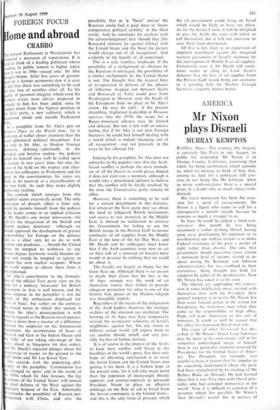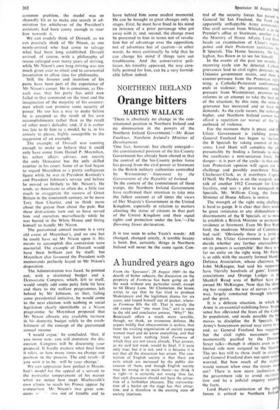AMERICA
Mr Nixon plays Disraeli
MURRAY KEMPTON
Well/lees, Mass.—The country, this August, is curiously like Paris in any August, its public life suspended. Mr Nixon is in Orange County, California, exercising that talent for being unobtrusive which reminds us, when we manage to think of him, that, among us. luck for a politician still con- sists in not being like Mr Johnson. After so many confrontations, there is a special grace in a leader who so much enjoys with- drawals.
His latest immersion has been the occa- sion for a spate of reassessments. Mr Nixon is a figure who seems to call for a retrospective a month—maybe because he remains so much a stranger to us.
In June, he could be judged a timid con- servative: this month he was being accounted a rather dashing liberal, having gone away proclaiming his intention so to revolutionise our welfare system as to make Federal assistance to the poor a matter of right rather than charity. The idea that government should guarantee every citizen a minimum level of income started to go about during the Kennedy and Johnson administrations, but was confined to their extremities, being thought too bold for adoption by either of his predecessors. Now Mr Nixon has taken it as his own.
The liberals are applauding this conver- sion in tones indelicately more satisfied with themselves than with the President; their general tendency is to praise Mr Nixon less than some fancied genius in the nation for broadening the narrowest men when they come to the responsibility of high office. Pride still leads Americans to this sort of nonsense. It could as well be argued that the °nice has narrowed broad men too.
The cause of what Newsweek has des- cribed as Mr Nixon's Great Leap Sideways may be more in his own nature and in his somewhat undeveloped image of himself than in any particular attention reserved by Providence for the United States of Amer- ica. The President. for example, Was careful to have it known that his impulse to do something fundamental about the poor had been strengthened by his reading of Mr Robert Blake on Disraeli. He had learned there that it was 'Tory men with liberal prin- ciples who had enlarged democracy in the world.' Now it is difficult to conceive of a presence which less parallels Mr Nixon's than Disraeli's would: but in matters of
common problem, the model was so shrewdly hit as to make one search in ad- miration for whichever of the President's assistants had been canny enough to steer him towards it.
We can crudely think of Disraeli, as we can precisely think of Mr Nixon, as one newly-arrived who had come to salvage what had been long established. Disraeli arrived, of course, with a philosophy of rescue enlarged over many years of striving, while Mr Nixon's own long striving was too much given over to ritual and to ceremonial incantation to allow time for philosophy.
Still, the fissures and inanition of his party have been part of the experience of Mr Nixon's career. He is conscious, as Dis- raeli was, that his party has until now failed in that command on the trust and the imagination of the majority of his country- men which can promise some security of power. He too has a way to make before he is accepted as the result of his own accomplishments rather than as the result of other men's defaults; and, if it is rather too late to fit him to a model, he is, in his anxiety to please, highly susceptible to the suggestion of an example.
The example of Disraeli was cunning enough to make us believe that it could only have come from Daniel P. Moynihan, his urban affairs adviser, not merely the only Democrat but the only skilled courtier in his court. Some of us had begun to regard Moynihan as a pretty ambiguous figure while he was in President Kennedy's and President Johnson's service and before he moved so blithely to Mr. Nixon's. He tends, as Americans so often do, a little too much to exaggerate the success of Great Britain in the nineteenth century, to be more Tory than Chartist, and to think more about the grease than about the pole. But these distractions turn out to have served him and ourselves marvellously while he was buried in the White House and fitting himself to handle Mr Nixon.
The guaranteed annual income is a very old cause of Moynihan's, and no one but he could have set Mr Nixon upon it. His means to accomplish this conversion were masterful. The example of Disraeli would have been brilliant just by itself; but Moynihan also ,favoured the President with memoranda perfectly keyed to Mr Nixon's disposition.
The Administration was faced, he pointed out, with a straitened budget and a Democratic Congress, which, left to itself, would simply add some petty little bit here and there to the welfare programmes left behind by Mr Johnson, so that failing some presidential initiative, he would come to the next election with nothing in social legislation clearly identifiable as a Nixon programme. So Moynihan proposed that Mr Nixon allocate any available increase in his domestic budget solely to the estab- lishment of the concept of the guaranteed annual income.
'I would argue,' he concluded, 'that, if you move now, you will dominate the dis- cussion. Congress will be discussing your proposal. It hardly matters what final form it takes, or how many times we change our position in the process. The end result—if you wish it to be—will be your change.'
We can appreciate how perfect is Moyni- han's model for the appeal of a servant to the particular temperament of his master when we notice how inept Machiavelli's own &ions to reach his Prince appear by comparison Mr Nixon's two great con- cerns a- • gay out of trouble and to leave behind him some modest memorial. He can be brought to great changes only in stages. First, he must have fixed in his mind an instance of a prior personage who got away with it; and, second, the change must be presented to him in terms not of revolu- tion but of advantage over the opposition, not of adventure but of caution—in other words, he must continually be told that he can change his mind if things turn out troublesome. And the conservative poli- tician, his timidity appeased, the way care- fully pointed for him, can be a very formid- able fellow indeed.



































 Previous page
Previous page